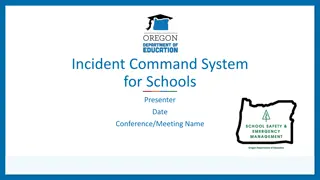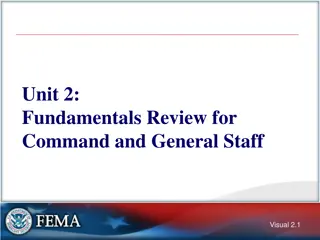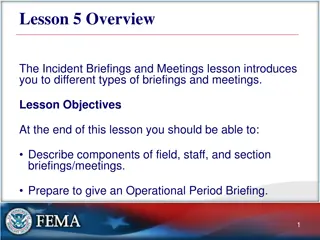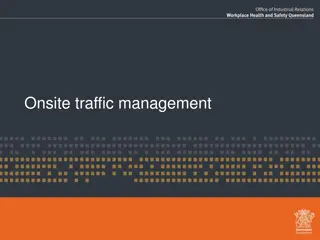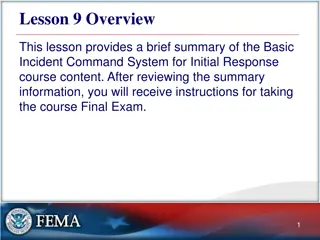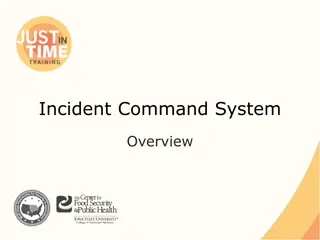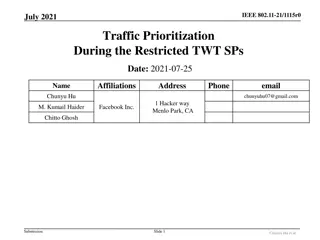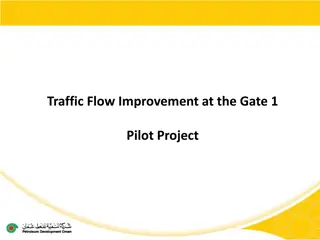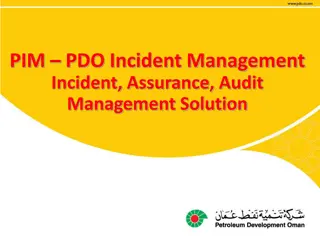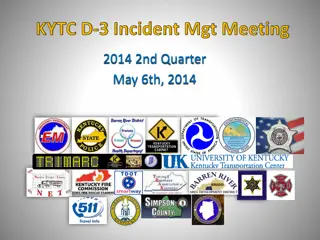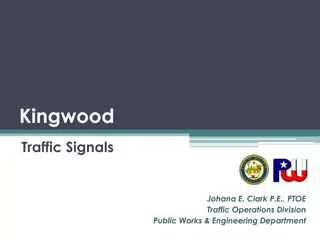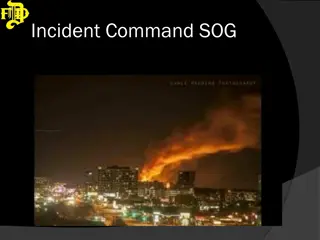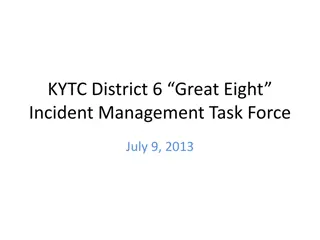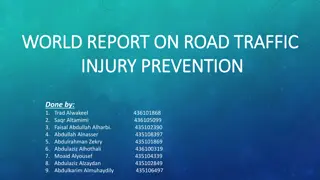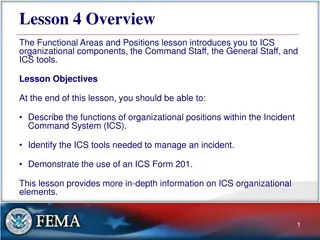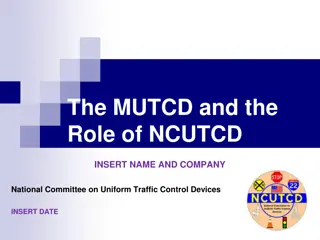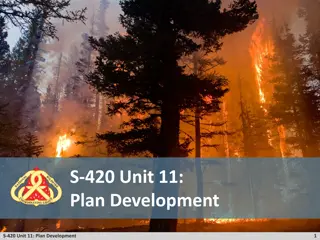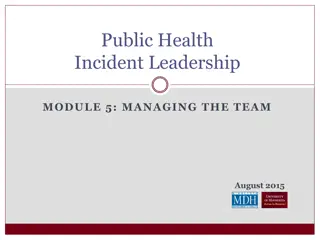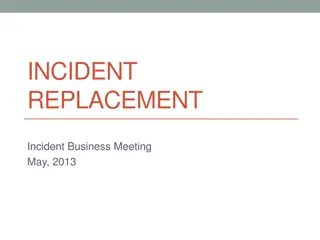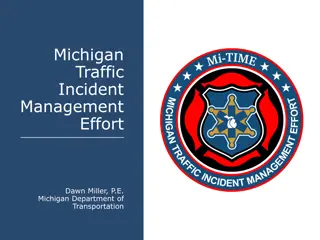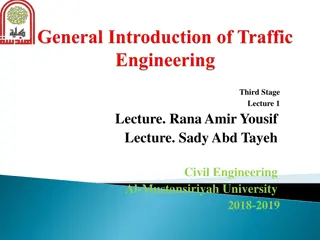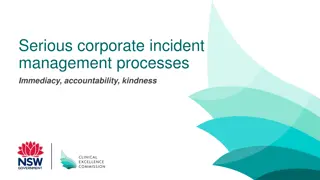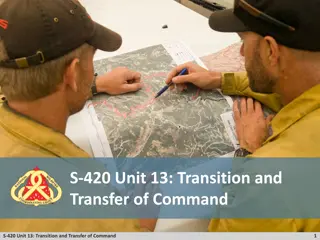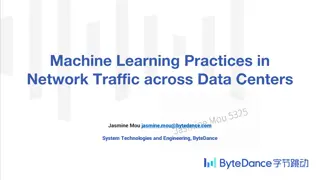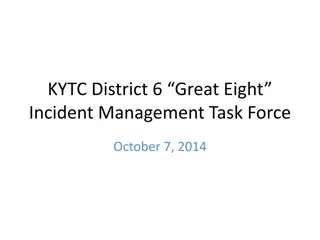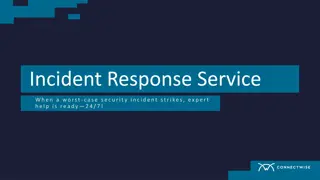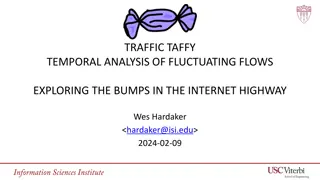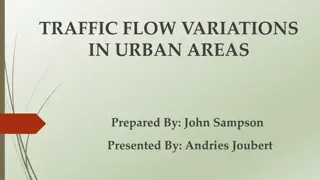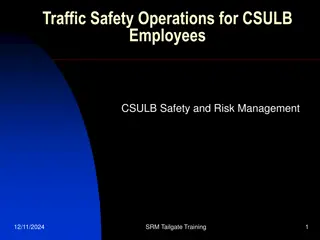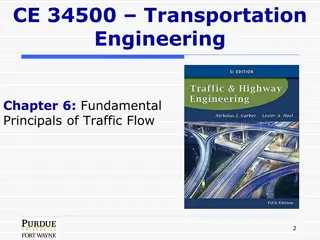Effective Incident Briefings and Meetings Overview
This lesson covers various types of briefings and meetings within the Incident Command System (ICS), including field, staff, and section briefings. It explores the Incident Action Planning Process for developing the IAP, emphasizing the importance of effective communication in incident management. T
0 views • 14 slides
Comprehensive Overview of Incident Command System for Schools
This presentation provides a detailed insight into the Incident Command System (ICS) for schools, outlining its purpose, structure, key concepts, and how individuals can fit into an ICS during emergencies. Topics covered include coordination with community partners, the importance of ICS, its struct
2 views • 16 slides
Understanding the Patient Safety Incident Response Framework (PSIRF)
The Patient Safety Incident Response Framework (PSIRF) is set to replace the Serious Incident Framework (2015) within the NHS, marking a significant shift in responding to patient safety incidents. Its key aims include compassionate engagement, system-based learning, proportionate responses, and sup
5 views • 9 slides
Incident Management Fundamentals and Command Structure Review
Explore key NIMS doctrine concepts, agency policies, incident complexity factors, and Unified Command functions in managing complex incidents or events. Learn about Incident Action Planning, transfer of command, and the roles of Command and General Staff positions. Gain insights into incident comple
0 views • 11 slides
Incident Briefings and Meetings: Overview and Best Practices
This lesson covers various types of briefings and meetings within the Incident Command System (ICS), such as field, staff, and section briefings. Learn how to prepare and conduct operational period briefings effectively, understand the Incident Action Planning Process, and master the art of deliveri
2 views • 14 slides
Understanding Traffic Turning Tendency Surveys in Transportation Studies
Transportation surveys are crucial for gathering data on traffic movements and factors influencing them. Traffic turning tendency, traffic counts, and flow characteristics help planners assess road efficiency and safety. Monitoring traffic volumes and patterns aids in optimizing road infrastructure
0 views • 16 slides
Prioritizing Effective Traffic Management at the Workplace
Addressing the importance of traffic management as a top priority issue, the session aims to engage workers in assessing current practices, enhancing traffic management strategies, and improving safety measures to prevent incidents. The discussion focuses on key principles of controlling traffic ris
2 views • 12 slides
Principles of Traffic Demand Analysis and Highway Demand Forecasting
Understanding traffic flows is crucial in designing highways and managing traffic effectively. Traffic demand analysis involves forecasting future traffic volumes, modeling demand, and determining the necessary infrastructure improvements. This analysis helps in estimating axle loadings, pavement th
0 views • 36 slides
Basic Incident Command System Overview
This lesson provides a summary of the Basic Incident Command System for Initial Response course content. It covers the NIMS framework, ICS management systems, incident command structure, unity of command, communication protocols, delegation of authority, and management by objectives. Understanding t
5 views • 15 slides
Incident Command System Overview and Structure
Incident Command System (ICS) provides a standardized approach to incident management. It offers flexibility, adaptability, and efficient management for incidents of varying sizes and complexities. ICS consists of top-down structure with key functions like logistics, operations, planning, finance/ad
1 views • 22 slides
IEEE 802.11-21/1115r0 Traffic Prioritization Summary
The presentation discusses traffic prioritization rules during restricted TWT SPs in IEEE 802.11-21/1115r0. It revisits the topic to address pending items related to traffic restriction or prioritization, including specific rules for APs, scheduled STAs, supporting non-AP STAs, and non-rTWT STAs. Co
1 views • 14 slides
Traffic Flow Improvement at Gate 1 Pilot Project Overview
The Traffic Flow Improvement project at Gate 1 aims to address congestion and safety issues by implementing a one-way traffic flow during peak times. The project involves rerouting traffic, creating designated lanes, and regulating access to optimize traffic movement and reduce the risk of accidents
0 views • 7 slides
Upgrade Highlights: Incident and Action Modules Enhancements
Explore the latest upgrades in the incident and action modules, including improved navigation, enhanced access controls, workflow changes, and new feature implementations like transportation consequences. Stay updated on the revamped Incident Management and Audit Solutions for efficient incident han
0 views • 10 slides
Understanding Programmable Traffic Management for Network Optimization
Programmable Traffic Management involves packet scheduling, traffic shaping, policing, drop policies, packet buffering, replication, and classification to optimize network performance. It is used in integrated switch architectures and is crucial for addressing diverse traffic characteristics and req
0 views • 66 slides
KYTC.D-3 Incident Management Meeting 2nd Quarter May 6th, 2014
The KYTC.D-3 Incident Management Meeting for the 2nd quarter of 2014 held on May 6th discussed various topics including recent incidents, emergency plans, construction projects, spill cleanup, and upcoming training opportunities. Detailed incidents such as crashes and fires on I-65 and Nunn Pkwy wer
0 views • 24 slides
Luxury Big Island SEO Report - February 2017 Summary
Sessions to the luxury Big Island website decreased by 21% in February 2017, but organic traffic saw an 11% increase attributed to a rise in total organic keywords. Top referrers for the past 6 months indicate Google and direct links drive the majority of traffic. The trend continued in February, wi
0 views • 13 slides
Kingwood Traffic Signals Overview and Updates
Traffic operations in Kingwood, managed by Johana E. Clark, P.E., include signal system improvements and updates. Recent changes involve signal removal studies, new signal installations, and upgrades at key intersections to enhance traffic flow and safety. The system's capacity and daily traffic vol
1 views • 11 slides
Incident Command Structure and Span of Control Overview
Incident Command Structure helps in managing incidents effectively by utilizing ICS terminology and levels as needed. The flexibility within ICS allows for structuring incidents correctly based on individual needs. Understanding the Span of Control is crucial for supervisors to manage the number of
2 views • 24 slides
KYTC District 6 Great Eight Incident Management Task Force Meeting Recap
Recap of the KYTC District 6 Great Eight Incident Management Task Force meeting held on July 9, 2013. The meeting covered incident reviews including a truck fire and fuel spill in Harrison County, responsibilities for debris removal after a truck/camper crash in Carroll County, a two semi crash in G
0 views • 44 slides
Understanding Traffic Response to Tolling: Insights from Research
Exploring how traffic reacts to road user charging, this study investigates the impact of tolling on traffic flow and revenue. With a focus on price elasticity and traffic modeling, the research examines the complexities of toll implementation and its effects on congestion and infrastructure needs.
0 views • 13 slides
Preventing Road Traffic Injuries: A Global Perspective
Road traffic injuries are a significant global issue, causing millions of deaths and injuries annually. This report highlights the complexity and dangers of road traffic systems, emphasizing the need for increased awareness and preventive measures at governmental, industrial, and individual levels.
1 views • 27 slides
Understanding Incident Command System (ICS) Organizational Components
This lesson introduces the key components of the Incident Command System (ICS), including the Command Staff, General Staff, and essential tools. It covers the roles of the Incident Commander, Deputy Incident Commander, and Command Staff positions, emphasizing their functions in managing incidents ef
0 views • 40 slides
Engaging Traffic Education Lesson for Students at Shaistagonj Kamil Madrasah
The introduction of Mr. Ariful Islam, a dedicated English lecturer at Shaistagonj Kamil Madrasah in Hobigonj, sets the stage for an interactive lesson on Traffic Education. With a focus on Dhaka city's traffic conditions, the lesson aims to help students identify traffic rules, cross roads carefully
0 views • 26 slides
Understanding the Role of NCUTCD in Traffic Control Management
The National Committee on Uniform Traffic Control Devices (NCUTCD) plays a crucial role in setting standards and guidelines for traffic control devices. Established in 1980, it advises the Federal Highway Administration (FHWA) on the Manual on Uniform Traffic Control Devices (MUTCD), facilitating re
0 views • 34 slides
Incident Management Plan Development Process Overview
The incident management plan development process involves activities such as preparation for tactics meeting, conducting the tactics meeting, and preparing for the planning meeting. The tactics meeting is crucial for breaking down overall incident objectives into tactical assignments for the next op
0 views • 8 slides
Effective Management of Public Health Incidents: Objectives and Team Leadership
Learn the importance of distinguishing between management objectives and incident objectives, linking objectives to response activities, and leading an Incident Management Team through the Planning P process. Explore the difference between general management objectives and operational incident objec
0 views • 28 slides
Incident Replacement Procedures and Guidelines in Business Meetings
Explore the process of incident replacement in business meetings, including who needs replacement items, approval authorities, and necessary forms to complete. Reference materials such as the IIBMH handbook and NWCG guidelines provide detailed insights into managing incidents effectively. Understand
0 views • 25 slides
Michigan Traffic Incident Management Effort Overview
Michigan's Traffic Incident Management Effort led by Dawn Miller, P.E. of the Michigan Department of Transportation aims to enhance traffic incident response and reduce fatalities and serious injuries on highways. Key initiatives include Mi-TIME training, high-visibility apparel, and public awarenes
0 views • 8 slides
Understanding Traffic Engineering Studies in Civil Engineering
Traffic engineering is a crucial aspect of transportation engineering that encompasses planning, design, and operation of roads, streets, and highways. It involves analyzing traffic volume, speed studies, parking patterns, traffic flow characteristics, accident studies, and more. Traffic volume stud
0 views • 37 slides
PhD in Telematics Engineering: Traffic Prediction with Big Data Technologies
This PhD study focuses on traffic prediction using Big Data technologies within Software-Defined Networking (SDN). It explores the separation of data and control planes in SDN architectures, emphasizing the benefits of centralized control for network operations. Additionally, the study delves into t
0 views • 33 slides
Corporate Incident Management Processes and Policy Update
Explore the corporate incident management processes and policy updates focusing on immediacy, accountability, and kindness. Learn about incidents, harm scores, and revised process steps outlined by the Clinical Excellence Commission and NSW Health. Discover the differences between the current and re
0 views • 17 slides
Transition and Transfer of Incident Command
Ensuring effective transition and transfer of incident command is crucial for incident management. This involves activities such as demobilization planning, transfer of command planning, incident package creation, and more. Detailed plans need to be in place to facilitate a smooth handover of author
0 views • 12 slides
Machine Learning Practices in Network Traffic Across Data Centers
This presentation focuses on machine learning practices in managing network traffic across data centers. It covers topics such as context and challenge definitions, machine learning approaches, unexpected traffic scenarios, major contributors, resource planning, and problem definitions related to tr
0 views • 18 slides
KYTC District 6 Incident Management Task Force Meeting Summary
The meeting of the KYTC District 6 Great Eight Incident Management Task Force on October 7, 2014, covered various incident reviews including the I-75 Brent Spence Bridge crash and an overturned semi on US 42. The meeting included introductions, approval of previous meeting minutes, and discussions o
0 views • 48 slides
ConnectWise Incident Response Service: Expert Help for Security Incidents
ConnectWise Incident Response Service offers expert assistance 24/7 for handling worst-case security incidents. Gain direct access to incident response analysts, real-time management, recovery procedures, insights on attacker tactics, and post-incident monitoring. Choose from flexible service option
0 views • 13 slides
Understanding Traffic Education: A Lesson on Traffic Jams and Solutions
Join Mr. Ariful Islam in his English class for Alim 1st year students as he introduces the topic of Traffic Education. Through warm-up activities and reading Michael Hobbes' article on traffic challenges in Dhaka, Bangladesh, students explore the causes of traffic jams and envision solutions to impr
1 views • 23 slides
Exploring Traffic Anomalies with Traffic Taffy: Network Operators' Challenges
Discover how network operators tackle odd anomalies in internet traffic with Traffic Taffy, a tool that aids in temporal analysis of fluctuating flows. Current solutions and specific problem spaces are discussed, alongside insights for comparing anomalies against baselines and defining the problem s
0 views • 24 slides
Traffic Flow Variations in Urban Areas: A Comparative Study Between 1980 and 2015
This study compares the traffic flow variations in urban areas, focusing on average daily traffic totals, daily traffic volumes, and monthly variations between the years 1980 and 2015 in Johannesburg. Data collection locations, including traffic data from different sites and lanes, are presented alo
0 views • 20 slides
CSULB Traffic Safety Operations Tailgate Training
Overview of CSULB Safety and Risk Management's training on traffic safety operations for employees, focusing on highway work zone accidents, traffic control, equipment operation, TTC plans, high visibility clothing, and vocabulary related to traffic control. Discusses DOT street type definitions, re
0 views • 15 slides
Understanding Traffic Flow Theory and Shock Waves in Transportation Engineering
Explore fundamental principles of traffic flow, applications of traffic flow theory, shock waves in traffic streams, and types of shock waves in transportation engineering. Learn about determining lane lengths, estimating delays, and analyzing shock wave behaviors in various traffic scenarios. Delve
0 views • 18 slides

